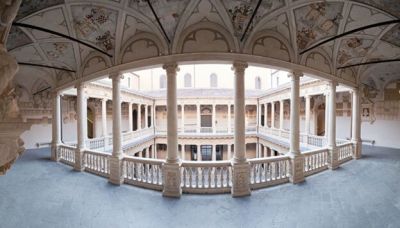L’articolo parla dell’Università di Padova, uno delle università più vecchie di tutta l’Europa. Per più di 800 anni, l’università continua ad offrire un’istruzione di eccellenza. Ci sono più di 60.000 studenti che frequentano l’università ogni anno. Molti studenti studiano medicina, scienze, tecnologie, e ricerche scientifiche. Gli edifici sono antichi e sono pieni di artefatti. L’università è più conosciuto per il suo Palazzo di Bo. Quindi, l’Università di Padova fu ed è una scuola ottima.
Nestled in the heart of Padua, Italy, lies one of Europe's oldest and most prestigious seats of learning: the University of Padua. Founded in 1222, it holds the distinction of being the second-oldest university in Italy, following the University of Bologna. Over its centuries-long existence, the University of Padua has been a beacon of academic excellence, intellectual inquiry, and cultural richness, leaving an indelible mark on the global academic landscape.
The University of Padua boasts a rich and storied history that spans over 800 years. It was established by a group of scholars and students seeking academic freedom and autonomy from religious and political interference. From its inception, the university became a hub for intellectual exchange, attracting some of the brightest minds of the time.
During the Renaissance, Padua emerged as a center of innovation and scholarship, with the university playing a pivotal role. It was here that groundbreaking figures such as Galileo Galilei and Andreas Vesalius made significant contributions to science, medicine, and philosophy, laying the foundation for modern scientific inquiry.
Today, the University of Padua continues to uphold its tradition of academic excellence, offering a wide range of undergraduate, graduate, and doctoral programs across various disciplines. With over 60,000 students enrolled annually, including a significant international student body, the university fosters a diverse and dynamic learning environment.
The university's faculty comprises esteemed scholars, researchers, and professionals who are at the forefront of their respective fields. Through their cutting-edge research and innovative teaching methods, they inspire and mentor the next generation of leaders and innovators.
Research is at the heart of the University of Padua's mission, driving advancements across diverse fields ranging from science and technology to the humanities and social sciences. The university is home to numerous research centers and institutes, where interdisciplinary collaboration flourishes, pushing the boundaries of knowledge and innovation.
From pioneering medical breakthroughs to addressing global environmental challenges, researchers at Padua are tackling some of the most pressing issues facing society today. Through partnerships with industry, government, and other academic institutions, they translate their findings into real-world solutions, making a tangible impact on society.
Beyond its academic achievements, the University of Padua is a custodian of cultural heritage, preserving centuries-old traditions and artifacts. Its historic buildings, including the iconic Palazzo del Bo, serve as tangible reminders of the university's illustrious past and architectural splendor.
Moreover, the university's rich cultural heritage extends beyond its physical campus, encompassing a vibrant community of scholars, students, and alumni from around the world. Through cultural events, exhibitions, and academic conferences, the university fosters dialogue and exchange, enriching the intellectual and cultural fabric of the local community and beyond.
The University of Padua stands as a testament to the enduring power of knowledge, inquiry, and innovation. For over eight centuries, it has remained a bastion of academic excellence, shaping the minds of generations and contributing to the advancement of human civilization. As it continues to evolve and adapt to the challenges of the modern world, the University of Padua remains firmly rooted in its commitment to scholarship, research, and cultural enrichment, ensuring its legacy endures for centuries to come.



